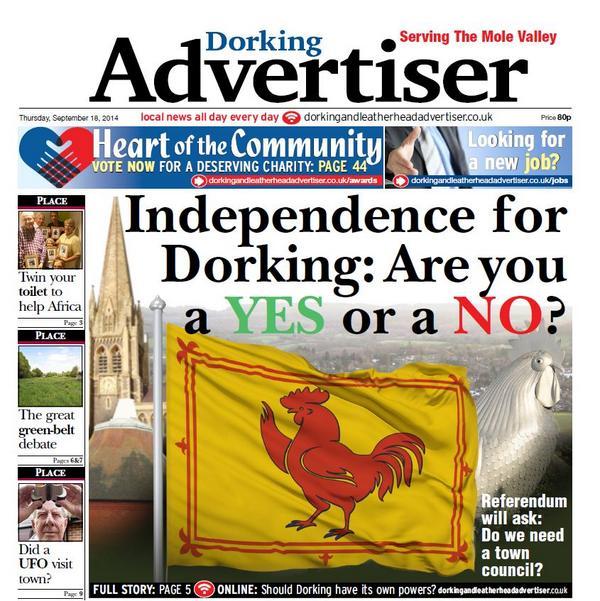http://whotv.com/2014/09/17/last-day-of-campaigning-before-scottish-independence-vote/
Last Day of Campaigning Before Scottish Independence Vote
Posted 6:16 am, September 17, 2014, by CNN, Updated at 06:48am, September 17, 2014
Facebook
Twitter
Google
Pinterest
LinkedIn
Email
Scotland Independence Vote
EDINBURGH, Scotland — Politicians are making their final pleas to Scottish voters Wednesday, the last day of campaigning before they head to the polls to vote on independence.
Opinion polls put the two sides neck-and-neck ahead of Thursday’s historic referendum, which could see Scotland split from the United Kingdom.
The latest poll of polls, released Wednesday by ScotCen, an independent research center, shows “no” at 51% and “yes” at 49%, with “don’t know” voters excluded. It is consistent with results over the past week or so, which have indicated the race is too close to call.
Polls suggest around 8% of voters remain undecided, making their votes crucial to deciding the outcome of the referendum.
The leader of the pro-independence “Yes Scotland” campaign, Scotland’s First Minister Alex Salmond, wrote an open letter to Scottish voters Wednesday.
Salmond: Decide with ‘clear head’
In it, he urged them to look past what he called the “increasingly desperate and absurd scare stories” of the pro-union “no” campaign, and think of Scotland’s future in their hands.
“For my part, I ask only this,” he writes. “Make this decision with a clear head and a clear conscience.
“Know that by voting ‘Yes’, what we take into our hands is a responsibility like no other — the responsibility to work together to make Scotland the nation it can be.”
In a rare show of unity, the leaders of the UK’s three main political parties penned a vow on Tuesday — published on the front page of the Scottish Daily Record newspaper — to transfer more powers to Scotland if it rejects independence in Thursday’s vote.
The issue of spending on social welfare and health care, through the National Health Service, has been central to campaigning. Questions over the economy, North Sea oil reserves and taxation have also been key.
Each side has argued that it is the best equipped to create more jobs for Scotland.
John Major: Scottish people ‘fed a load of pap’
As the vote nears, emotions are running high on both sides of the divide.
There were chaotic scenes as Labour Party leader Ed Miliband met with members of the public on Tuesday, forcing him to cut short a meet and greet.
Prime Minister David Cameron pleaded on a visit to Aberdeen this week for Scotland to stay in the union. If they leave there will be no return, he warned, saying, “This is a once-and-for-all decision.”
Cameron will face tough questions over the effectiveness of the pro-union “Better Together” campaign if Scotland opts to leave, with critics accusing the main parties in Westminster of complacency over the vote. They have also questioned the promise of more powers for Scotland if it stays, warning that England and Wales should not lose out.
In an interview with the Times of London on Wednesday, Cameron defended the way the referendum has been handled by his Conservative-led coalition government.
He said he had been right to offer only the option of independence or continued union on the ballot paper, rather than including a third option of further devolved powers for Scotland.
He suggested that Scottish independence might actually be closer today if he had said no to a vote, rather than offering a “proper, legal, fair and decisive referendum.”
Former Prime Minister John Major also made an impassioned plea for Scotland to stay in the United Kingdom Tuesday, telling CNN’s Christiane Amanpour that the Scottish people have been hoodwinked.
“The Scottish nation have frankly, and I don’t say this lightly, have been fed a load of pap by the Scottish nationalists in the belief that everything will be alright on the night,” he said.
“Well it won’t. There are very serious problems that Scotland will face if they go down this route.”
Largest ever electorate
Many questions remain unanswered about what will happen if Scotland votes to go it alone, including its future membership in the European Union and NATO and over the United Kingdom’s future defense capabilities.
In an open letter published in UK tabloid The Sun on Wednesday, 14 former UK defense chiefs warned against breaking up the union.
“At risk is the most successful alliance in history and one which has seen men and women from all parts of the country play their part in securing the liberties we now enjoy,” they wrote.
“The division of the UK may or may not be politically or economically sensible, but in military terms we are clear: it will weaken us all.”
The Scottish National Party, headed by Salmond, has said it wants to remove the UK nuclear submarine fleet from Scottish waters as soon as possible.
More than 4.2 million people have registered to vote, the largest electorate ever in Scotland.
Any registered voter aged 16 or over who is a resident in Scotland is entitled to cast a ballot. Voters do not have to be British citizens; Commonwealth, Irish and EU citizens who live in Scotland and are registered to vote there can do so.
They will be asked the yes/no question: Should Scotland be an independent country?
If Scotland decides to leave the United Kingdom, it leaves behind England, Wales and Northern Ireland.
Trademark and Copyright 2014 Cable News Network, Inc., a Time Warner Company. All rights reserved.
Filed in: News
Topics: independence, sctoalnd, UK, world
2 comments












